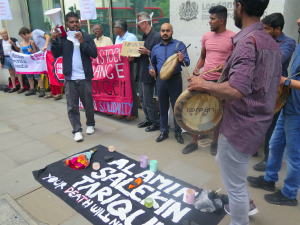 31st August. This news from Phulbari Solidarity following their celebration of a decade of resistance to UK company GCM’s open cast coal mine plans, and commemorating the death of three protesters shot by paramilitary forces in 2006.
31st August. This news from Phulbari Solidarity following their celebration of a decade of resistance to UK company GCM’s open cast coal mine plans, and commemorating the death of three protesters shot by paramilitary forces in 2006.
Friday the 26th August, marked a decade of halt to plans by an AIM-listed British company, Global Coal Resources Management (GCM), who want to build a massive open cast coal mine by forcibly displacing 130,000 people in Phulbari, northwest Bangladesh. A four day long Commemoration for victims of Phulbari outburst, where three protesters were shot dead by police in 2006, was held in Dkaka, Dinajpur, Phulbari, London and Germany. On the final day of remembrance, on 30th August, the National Committee to Protect Oil, Gas, Mineral Resources, Power and Ports in Bangladesh has declared a fresh programme in Phulbari to kick GCM out of Bangladesh as the CEO of the company has recently filed multiple arbitrary charges against indigenous farmers, small businessmen and local leaders who opposed the mine.
In London, in support of Phulbari protesters, community activists under the banner of Phulbari Solidarity Group and Committee to Protect Resources of Bangladesh held a colourful and powerful commemoration rally and protest at London Stock Exchange , calling for the de-listing of the company from London Stock Exchange. Despite heavy securitization and repeated attempts of interruption by police last Friday, protesters blocked up the pavement at the main entrance of London Stock Exchange (LSE) for two hours and demanded immediate de-registration of GCM for its unethical business, deceitful marketing of Phulbari project, and for human rights abuse in Dinajpur and Phulbari. Prior to the demo, Phulbari Solidarity Group has submitted evidence of unethical business of the company to the CEO of London Stock Exchange, Xavier Rolet KBE, via email.
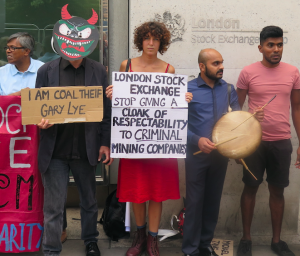 A remembrance vigil was held, followed by an angry demo with Santal and Tamil drumming, and ended with tribute by flowers and candles being paid to the three people who were killed by paramilitary force, allegedly paid by the company, in Phulbari on 26 August in 2006. Wearing masks of Gary Lye (CEO of GCM) and Michael Tang (the Chairman of the company), the protesters sang Phulbari jingles against coal mine. The protest observed a three-minute silence for the three victims, Al—Amin, Salekin and Tariqul, who died in the Phulbari shooting. Dressed in red, blue and black, protesters laid down a banner for victims, stating “YOUR DEATH WILL NOT BE IN VAIN”, on the pavement of the London Stock Exchange. Protesters from Bangladesh were joined by international and British environmental campaigners, and advocates for human rights, anti-mining movement and workers rights.
A remembrance vigil was held, followed by an angry demo with Santal and Tamil drumming, and ended with tribute by flowers and candles being paid to the three people who were killed by paramilitary force, allegedly paid by the company, in Phulbari on 26 August in 2006. Wearing masks of Gary Lye (CEO of GCM) and Michael Tang (the Chairman of the company), the protesters sang Phulbari jingles against coal mine. The protest observed a three-minute silence for the three victims, Al—Amin, Salekin and Tariqul, who died in the Phulbari shooting. Dressed in red, blue and black, protesters laid down a banner for victims, stating “YOUR DEATH WILL NOT BE IN VAIN”, on the pavement of the London Stock Exchange. Protesters from Bangladesh were joined by international and British environmental campaigners, and advocates for human rights, anti-mining movement and workers rights.
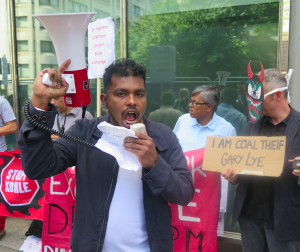 Friday’s blockade at London Stock Exchange echoed the demands made by the National Committee to Protect Oil, Gas, Port-Power and Mineral Resources in Bangladesh during tributes paid to the victims of Phulbari at National Martyrs Memorial in Dhaka, and red vigil and cultural events in Phulbari. The four-day celebration of Phulbari resistance in Bangladesh ended yesterday with the launch of a film on Phulbari to Rampal, called the “Deception of Development” followed by a post-screening discussion at Mukti Bhavan in Dhaka.
Friday’s blockade at London Stock Exchange echoed the demands made by the National Committee to Protect Oil, Gas, Port-Power and Mineral Resources in Bangladesh during tributes paid to the victims of Phulbari at National Martyrs Memorial in Dhaka, and red vigil and cultural events in Phulbari. The four-day celebration of Phulbari resistance in Bangladesh ended yesterday with the launch of a film on Phulbari to Rampal, called the “Deception of Development” followed by a post-screening discussion at Mukti Bhavan in Dhaka.
Global Coal Management, formerly known as Asia Energy, has been allegedly involved in abuse and harassment of opponents of the proposed Phulbari mine. Media reports on the brutal death of Nasrin Huq, the former executive director of Action Aid, revealed that Huq was killed brutally in her car park because of her strong opposition to the project.i Later in August 26 in 2006, three people were shot dead and two hundred injured in a demonstration of 80,000 people who marched against plans by the company. Local organisers have reported that the company has bribed the paramilitary personnel and forced them to open fire against the decision of the Police Magistrate on duty who stated that there was no permission for shooting on people. The day has been called Phulbari Day since, and powerful resistance in the aftermath of the shooting against open-cast mine in Phulbari has put a decade long halt to the project. Government has cancelled the company’s license but the company has been pushing the government to give them a go ahead. The CEO of the company, Gary N Lye, has recently (July 25, 2016) filed multiple arbitrary charges against 26 key organiser’s and local political leaders who opposed the mine.
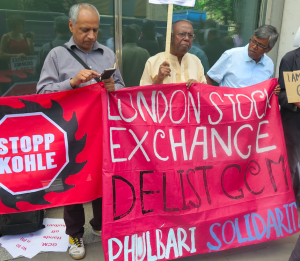 The PSG spokesperson and an eye witness to the Phulbari outburst in 2006, Rumana Hashem said:
The PSG spokesperson and an eye witness to the Phulbari outburst in 2006, Rumana Hashem said:
“the company is abusing our people and criminalising society in Bangladesh. We will hold them to account here. We will chase up London Stock Exchange and will ensure that this company could never go back to Bangladesh.’”
Akhter Sobhan Khan of Committee to Protect Resources of Bangladesh said that:
“The company does not have a valid contract with Bangladesh; nevertheless they are selling shares in the name of Phulbari project. London Stock Exchange must de-list GCM as they are doing deceitful marketing of the project”.
Anu Muhammad of Bangladesh National Committee noted:
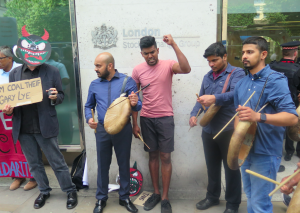 “This company is harassing activists with false charges, and the CEO of the company is extremely abusive. We have declared a fresh programme on Phulbari Day to resist GCM and the coal mining project. This includes rally demanding a ban of the company in Phulbari on 25 October, blockade of the Dinajpur District Commissioner’s Office on 21 November and half-day strike in Phulbari on 21 December. If demands are unfulfilled by December, intense and unending strike would start. We will not let the destructive mine to be built.”
“This company is harassing activists with false charges, and the CEO of the company is extremely abusive. We have declared a fresh programme on Phulbari Day to resist GCM and the coal mining project. This includes rally demanding a ban of the company in Phulbari on 25 October, blockade of the Dinajpur District Commissioner’s Office on 21 November and half-day strike in Phulbari on 21 December. If demands are unfulfilled by December, intense and unending strike would start. We will not let the destructive mine to be built.”
If the mine is built, 130,000 families of farmers in Phulbari would be forcibly displaced. It would destroy 14,600 hectares of highly cultivable land, would pose threats to clean water resources and would leave devastative impact on one of the world’s largest mangrove forests and UNESCO heritage site, the Sunderbans. In February 2012, seven UN rapporteurs expressed grave concerns to the project, and at national and international level. The UK National Contact Point has acknowledged the strong opposition to the project in an assessment last year.
i The mystery death of Nasrin Huq – a report to which the company was not able to respond, was derived from http://www.guardian.co.uk/world/2006/sep/03/bangladesh, last cited on 01. 01. 2013